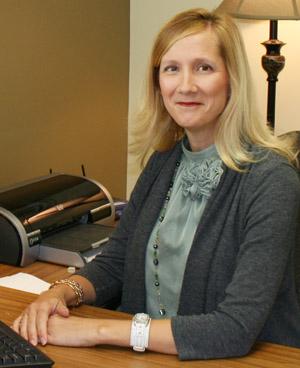
By Anne Marie Amacher
(The Catholic Messenger is highlighting various programs and ministries offered through the Diocese of Davenport’s Catholic Charities. This is the fifth in a series of stories.)
For years, therapists with Catholic Charities of the Diocese of Peoria, Ill., have offered services in their Rock Island office to people from the Diocese of Davenport.
Now space is available in the newly renovated diocesan headquarters in Davenport for the three therapists to serve Iowa clients a little easier, said Penny Kain of Catholic Charities in Rock Island.
“Office space was a big hurdle,” she said of efforts over the years for the two dioceses to collaborate on counseling services. The few hours of service being sought didn’t justify renting an office in Iowa to accommodate Iowa Quad-City clients.
“It came to fruition when the building was renovated and we have been grateful.” She and fellow therapists Amber Dopler and Kim Allen offer a variety of services for residents of the Davenport Diocese.
Those services include individual, family and couple counseling, divorce and family mediation and group meetings on topics such as relationships and anger management. The therapists also are available to make presentations in the community and in schools on such topics as bullying. Workshops also are an option. Group meetings are based on what members of the community identify as needed, Kain said.
Since mediation became a requirement of Illinois law in 2008, the therapists also work with parents who are separated or divorced to deal more effectively with issues related to their children. “We work together as a team versus (couples) fighting it out in court.”
Although mediation is not required by law in Iowa, lawyers in that state have also referred couples to the therapists, she said.
“We don’t make decisions for them. We work on parenting skills and what is in the best interests for the children. This is a great service for the community.”
Demand for services has been a little slower than the therapists had hoped. “We’ve been working at getting the word out,” she said, referring to advertising in various parish bulletins.
Limited evening hours are available and the therapists are willing to see Iowa clients in their Rock Island office if that is more convenient. Kain said some clients work in Illinois and prefer to stop at the Rock Island office after work. The therapists generally do not offer weekend appointments.
All services offered by Catholic Charities therapists in the Davenport or Rock Island offices can be billed to insurance or paid as a fee on a sliding scale.
“There have been mental health laws passed over time that cover services by licensed therapists and counselors,” Kain said. “We are licensed and on many insurance lists.”
For those without insurance or who lack coverage for counseling, the sliding scale fee figures income and the number of people supported by that income. “We never turn anyone down because of inability to pay.”
For more information or to set up an appointment in either office, call the Catholic Charities of Diocese of Peoria office in Rock Island at (309) 788-9581.
Catholic Charities collaborate
“One aspect of partnering is working collaboratively with other Catholic Charities,” says Kent Ferris, director of social action for the Diocese of Davenport. That department oversees Catholic Charities in the diocese.
In addition to the counseling arrangement with Catholic Charities in the Peoria Diocese, “we have had conversations with two other Catholic Charities here in the Midwest about our utilization of Volunteer Organizations Active in Disasters (VOADs) regarding emergency preparedness and response,” he said. Catholic Charities in the archdioceses of Dubuque, Iowa, and Omaha, Neb., like the approach the Davenport Diocese’s Catholic Charities has taken concerning emergency preparedness and response.
Other examples of collaboration include Catholic Charities of Des Moines assisting an immigration office client in Des Moines who is seeking needed documents, and Catholic Charities of the Archdiocese of Dubuque asking permission of the Davenport Diocese’s Catholic Charities to proceed with assisting a refugee relocating to a rural town in the Davenport Diocese.
Collaboration can also occur with other agencies. Ferris said some agency connections began decades ago when Msgr. Marvin Mottet served as social action director for the Davenport Diocese. “Agencies have asked our assistance in finding board members who can represent those we serve and/or our faith community. These collaboration efforts go above and beyond merely strengthening the information and referral work we are responsible for.”
The goal is to draw from among active community members throughout the diocese who can “lend their input to community needs and corresponding needs for the ‘Common Good,’ a concept that is important to Catholic Social Teaching and not dependent on our Catholic Charities being the provider,” Ferris said.
Catholic Charities’ greatest need now is “partnering,” which begins with active, local parish members sharing what they know about their respective communities. “Learning this will enable us to be better neighbors and better partners ourselves.”








